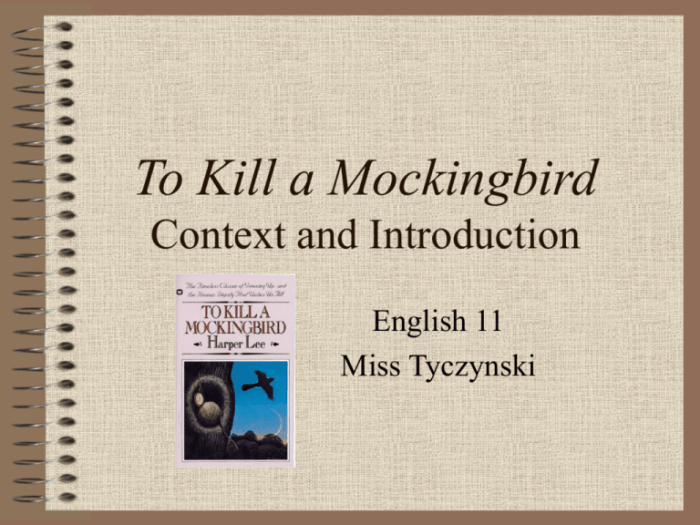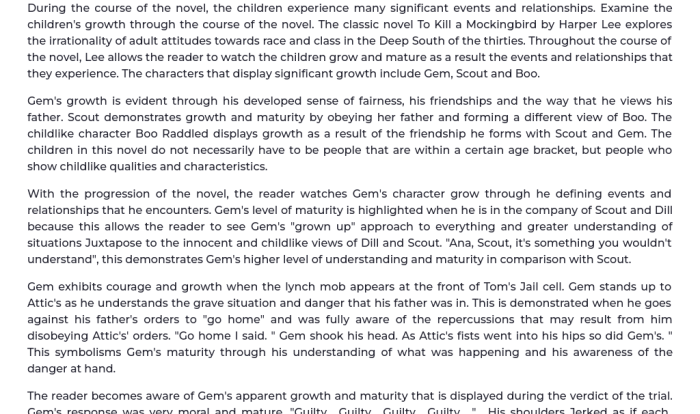Embarking on an exploration of “dictum definition to kill a mockingbird,” this analysis delves into the profound use of “dictums” within Harper Lee’s classic novel. These wise and thought-provoking statements serve as guiding principles, shaping the characters’ actions and beliefs while illuminating the novel’s exploration of justice, prejudice, and moral ambiguity.
The concept of “dictum” holds deep historical and cultural significance, reflecting societal norms and values. In the context of “To Kill a Mockingbird,” the use of “dictums” becomes particularly poignant, as they embody the wisdom and morality of Atticus Finch, a character renowned for his integrity and unwavering commitment to justice.
Meaning and Etymology of ‘Dictum’: Dictum Definition To Kill A Mockingbird

The term “dictum” originates from the Latin word “dictum,” which means “something said” or “a statement.” In a legal context, it refers to a formal declaration or ruling made by a judge or legal authority. In literary usage, it can denote a memorable or significant statement, often attributed to a notable figure.
‘Dictum’ in To Kill a Mockingbird

In Harper Lee’s novel “To Kill a Mockingbird,” the term “dictum” appears several times, carrying significant weight within the story. It highlights the importance of wisdom, morality, and the search for justice.
Atticus Finch’s ‘Dictums’
Atticus Finch, the novel’s protagonist, is known for his wisdom and moral compass. His “dictums” are often profound and thought-provoking, guiding his actions and shaping the novel’s themes.
- “You never really understand a person until you consider things from his point of view… Until you climb into his skin and walk around in it.”
- “The one thing that doesn’t abide by majority rule is a person’s conscience.”
Thematic Significance of ‘Dictums’, Dictum definition to kill a mockingbird
The use of “dictums” in “To Kill a Mockingbird” underscores the novel’s exploration of justice, prejudice, and moral ambiguity. These statements serve as guiding principles for the characters, shaping their decisions and beliefs.
Atticus’s “dictums” emphasize the importance of empathy, understanding, and standing up for what is right, even in the face of adversity. They challenge the societal norms and prejudices that perpetuate injustice and inequality.
Historical and Cultural Context
The concept of “dictum” has historical and cultural significance. In ancient Rome, the “dictum” of a dictator held the force of law. Throughout history, “dictums” have been used to convey wisdom, establish moral principles, and shape societal values.
In “To Kill a Mockingbird,” the “dictums” reflect the changing social landscape of the American South in the mid-20th century. They challenge prevailing prejudices and promote a more just and equitable society.
Top FAQs
What is the significance of “dictums” in “To Kill a Mockingbird”?
The “dictums” in “To Kill a Mockingbird” embody the wisdom and morality of Atticus Finch, serving as guiding principles that shape the characters’ actions and beliefs while illuminating the novel’s exploration of justice, prejudice, and moral ambiguity.
How does Atticus Finch use “dictums” to teach his children?
Atticus Finch uses “dictums” to impart valuable lessons to his children, instilling in them a deep understanding of morality, empathy, and the importance of standing up for what is right.
What is the historical and cultural context of “dictums”?
The concept of “dictum” holds deep historical and cultural significance, reflecting societal norms and values. In the context of “To Kill a Mockingbird,” the use of “dictums” becomes particularly poignant, as they embody the wisdom and morality of Atticus Finch, a character renowned for his integrity and unwavering commitment to justice.




